- Taylor McLaren
- Albums and Singles
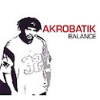 Just after Saul Williams' Amethyst Rock Starwas released, I got into some great arguments with longtime hip-hopfans who found his high-minded, pandering-be-damned (literally)approach to hip-hop a tad bit pretentious. Similar complaints can't bemade about Akrobatik, who comes across instead like the cool-but-savvyuncle that every kid should be able to turn to for advice. Ak is allfor doling out the science, but like he says on the title track, "Youcan study for years and be the world's top scholar, but trying to makethe fans feel dumb won't make 'em holler." Most of the album is aboutkeeping it together in one way or another, finding common groundbetween the nerds and the thugs, building communities that sustainthemselves, and generally being excellent to one another: Keanu Reeveswould be proud, and the front-porch family feel of most of the albummakes for friendly, comfortable listening. The inclusion of "Woman, Pt.II" (an honest take on the conflicting impulses behind dating) justlends, well, balance to the proceedings. As you might expect by now, Balancefeels more like the effort of an accomplished craftsman than theproduct of some firebrand artist: the bombast and atmosphere of, say, aDef Jux or Hieroglyphics record is nowhere in sight, and I'm not alwaysin the mood for the Sunday-afternoon coziness of some of this stuff.(Think Blackalicious without the craziest of the verbal gymnastics andyou've just about got it.) Oh, and it does feature one bog-standardObnoxious DJ Intro (courtesy of Evil Dee, on the album-low track"Always Bet On Ak")... I guess that's a negative point, too. Asantidotes to hip-pop go, though, this one is well worth hearing. Thatmight not be the strongest recommendation possible, but maybeunassuming support is what's called for with an album and an artistlike this.
Just after Saul Williams' Amethyst Rock Starwas released, I got into some great arguments with longtime hip-hopfans who found his high-minded, pandering-be-damned (literally)approach to hip-hop a tad bit pretentious. Similar complaints can't bemade about Akrobatik, who comes across instead like the cool-but-savvyuncle that every kid should be able to turn to for advice. Ak is allfor doling out the science, but like he says on the title track, "Youcan study for years and be the world's top scholar, but trying to makethe fans feel dumb won't make 'em holler." Most of the album is aboutkeeping it together in one way or another, finding common groundbetween the nerds and the thugs, building communities that sustainthemselves, and generally being excellent to one another: Keanu Reeveswould be proud, and the front-porch family feel of most of the albummakes for friendly, comfortable listening. The inclusion of "Woman, Pt.II" (an honest take on the conflicting impulses behind dating) justlends, well, balance to the proceedings. As you might expect by now, Balancefeels more like the effort of an accomplished craftsman than theproduct of some firebrand artist: the bombast and atmosphere of, say, aDef Jux or Hieroglyphics record is nowhere in sight, and I'm not alwaysin the mood for the Sunday-afternoon coziness of some of this stuff.(Think Blackalicious without the craziest of the verbal gymnastics andyou've just about got it.) Oh, and it does feature one bog-standardObnoxious DJ Intro (courtesy of Evil Dee, on the album-low track"Always Bet On Ak")... I guess that's a negative point, too. Asantidotes to hip-pop go, though, this one is well worth hearing. Thatmight not be the strongest recommendation possible, but maybeunassuming support is what's called for with an album and an artistlike this.samples:
Read More
- Administrator
- Albums and Singles
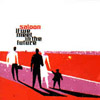 Last year around this time, I reviewed Saloon's debut album, This Is What We Call Progress.In it, I expressed the hope that with time, the Reading, UK quintetwould more fully develop and enrich their fledgling sound. If We Meet In the Future,their new album, unfortunately does not show evidence of the outcomefor which I'd hoped. Still taking strong cues from Stereolab andBroadcast, Saloon sadly never seems to quite live up to their fullpotential. This is not to say that any of their songs are unlistenable,but simply that their humble approach to recording is just *too*humble. If We Meet In the Future has a few lovely tracks: "QueQuieres?" is soothingly melancholic and "Dreams Mean Nothing" featuresa hypnotic film-noir croon. The originality of these two tracks standin marked contrast to more meandering, uninteresting songs like"Absence" and "The Good Life." Lead singer Amanda Gomez' voice is sweetand easy on the ears, but often lacks backbone. That said, and despitemy complaints with this album, I still feel that Saloon has the talentto come into their own and mature into something more substantial, butthe question remains whether or not they can actually pull it off.
Last year around this time, I reviewed Saloon's debut album, This Is What We Call Progress.In it, I expressed the hope that with time, the Reading, UK quintetwould more fully develop and enrich their fledgling sound. If We Meet In the Future,their new album, unfortunately does not show evidence of the outcomefor which I'd hoped. Still taking strong cues from Stereolab andBroadcast, Saloon sadly never seems to quite live up to their fullpotential. This is not to say that any of their songs are unlistenable,but simply that their humble approach to recording is just *too*humble. If We Meet In the Future has a few lovely tracks: "QueQuieres?" is soothingly melancholic and "Dreams Mean Nothing" featuresa hypnotic film-noir croon. The originality of these two tracks standin marked contrast to more meandering, uninteresting songs like"Absence" and "The Good Life." Lead singer Amanda Gomez' voice is sweetand easy on the ears, but often lacks backbone. That said, and despitemy complaints with this album, I still feel that Saloon has the talentto come into their own and mature into something more substantial, butthe question remains whether or not they can actually pull it off.samples:
Read More
- Administrator
- Albums and Singles
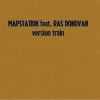 Stefan Schneider's latest release as Mapstation features reworkings andversions of tracks from his full-length, as well as some new tracks.The focus is on Schneider's work with reggae singer Ras Donovan on"Gravity" and "Wake Up," which appeared on A Way to Find the Dayand gets two versions here. While the pairing is an interesting onethat is sure to spark more interest and conversation, it is still anawkward one as this release shows. The two men have certainly grownmore comfortable working together, and their music is full of melodywith a lazy shifting style. Relaxation is a given, with a gentle bounceand sway that begs the body to rise and fall with the proceedings.Unfortunately, the collaboration still doesn't connect fully, withSchneider's music providing a backdrop that is often, though notalways, jarred by the voice and inflections of Donovan. "Gravity" isfull of lyrics of polarity, opposites, and the expected call-outs ofreggae and dub, but Donovan's staccato is still too harsh for itssurroundings. "Wake Up" gets reinterpreted with Scallo, a DJ-vocalistwith ties to Donovan, but Scallo's jarring delivery creates cracks inan otherwise smooth exterior. "Wake Up version," in fact, is arevelation just because it features no vocals, and the true essence ofthe track is allowed to be on display. Not to be too cutting, though,on "Be True" the pair get it just right: Donovan wails and professes,with as little rapping or chatting as possible. Suddenly atransformation occurs, and even though the lyrics are a bit simplistic,juvenile, even, the rhythm and vocals are sexy enough to make you losecontrol, and forget whatever you were just thinking about. Schneider'sother work, including Radian's Martin Brandlmayr this time, is asconcise and yet full of life as always, particularly "Effects of MyHaste." For once, I felt the true meaning of the Donovan connection,though, and based on the promise of "Be True," there's greatness on thehorizon from these two.
Stefan Schneider's latest release as Mapstation features reworkings andversions of tracks from his full-length, as well as some new tracks.The focus is on Schneider's work with reggae singer Ras Donovan on"Gravity" and "Wake Up," which appeared on A Way to Find the Dayand gets two versions here. While the pairing is an interesting onethat is sure to spark more interest and conversation, it is still anawkward one as this release shows. The two men have certainly grownmore comfortable working together, and their music is full of melodywith a lazy shifting style. Relaxation is a given, with a gentle bounceand sway that begs the body to rise and fall with the proceedings.Unfortunately, the collaboration still doesn't connect fully, withSchneider's music providing a backdrop that is often, though notalways, jarred by the voice and inflections of Donovan. "Gravity" isfull of lyrics of polarity, opposites, and the expected call-outs ofreggae and dub, but Donovan's staccato is still too harsh for itssurroundings. "Wake Up" gets reinterpreted with Scallo, a DJ-vocalistwith ties to Donovan, but Scallo's jarring delivery creates cracks inan otherwise smooth exterior. "Wake Up version," in fact, is arevelation just because it features no vocals, and the true essence ofthe track is allowed to be on display. Not to be too cutting, though,on "Be True" the pair get it just right: Donovan wails and professes,with as little rapping or chatting as possible. Suddenly atransformation occurs, and even though the lyrics are a bit simplistic,juvenile, even, the rhythm and vocals are sexy enough to make you losecontrol, and forget whatever you were just thinking about. Schneider'sother work, including Radian's Martin Brandlmayr this time, is asconcise and yet full of life as always, particularly "Effects of MyHaste." For once, I felt the true meaning of the Donovan connection,though, and based on the promise of "Be True," there's greatness on thehorizon from these two.samples:
Read More
- Administrator
- Albums and Singles
 There's a chilled-out and generally cool feeling to every song on this disc. Every song is a pure, vibrating, and relaxing mix of dub beats and hypnotic melodies culled from a myriad of cultural influences.On-U Sound
There's a chilled-out and generally cool feeling to every song on this disc. Every song is a pure, vibrating, and relaxing mix of dub beats and hypnotic melodies culled from a myriad of cultural influences.On-U Sound
Adrian Sherwood blends everything together with elegant production techniques; consuming bass melodies and driving rhythms ride into and run with floating guitar melodies, blaring saxophones, and dabs of sitar and tablas. The album kicks off with a killer mix of Prince Far I's "African Landing" and never comes down from that point: it's a swirling mesh of heavy bass, uplifting guitars, and a plethora of studio tricks. Sherwood has a knack for making the smallest adjustments to certain sounds so that, despite their sometimes repetitive nature, they sound fresh throughout. "Let the Spirit Rise" makes excellent use of this technique. A rabid and hyper bass melody parades throughout the entire song while James Bond-esque strings and smoothness wonder about over the top. Multiple times throughout the song Sherwood swtiches up the color of that melody and pans it all over the stereo spectrum keeping the same tune moving throughout the whole song in various forms. There's a special sort of attitude suffused throughout every song. My shoulders always loose their tension, my head always starts nodding, and my breathing always slows and deepens when listening. I'm not sure how, but Dub Syndicate manages to keep every song laid back while still applying gracious amounts of funk and groove.
samples:
Read More
- Michael Patrick Brady
- Albums and Singles
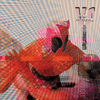 Collaboration between jazz and hip-hop seems very natural, and one would expect the meeting of these two creative, improvisational, dynamic styles would result in a compelling piece of music. Still, the individual components of such a meeting would have to be up to the task, and on this release one side is, and the other is clearly not. Things start out well enough with "Places I've Never Been."Thirsty Ear
Collaboration between jazz and hip-hop seems very natural, and one would expect the meeting of these two creative, improvisational, dynamic styles would result in a compelling piece of music. Still, the individual components of such a meeting would have to be up to the task, and on this release one side is, and the other is clearly not. Things start out well enough with "Places I've Never Been."Thirsty Ear
Shipp takes advantage of the piano's percussive side and pounds out chord beats that bounce and put the programmed beats that lay over them to shame. Synth and bass sidle alongside Shipp for texture, but his piano is the centerpiece, and the synthesis of these elements amps up expectations for what is to follow. Unfortunately, the very next track lets all the air out of the tires. "Staph" is where Antipop comes in, and after a tuneful intro by Shipp's band, Antipop's Beans and Priest follow along like an anchor. Their flow, if you can call it that, is akin to the clipped, speedy delivery of an auctioneer and seems to move along the tune as if they recorded it irrespective of the beats programmed. Their verses sit awkwardly in open spaces in the middle of the body of the jazz tune, which eventually fades out unceremoniously. "I think there'd be some very angry listeners," recites Antipop on "Short Horn," "if there wasn't vocals over this." Much of the lyrics on this track are about how what we are listening to is "powerful music," however I can't help but feel that Antipop's lethargic, mediocre presence is robbing Shipp, Parker, Brown, Jamal, and Carter of their strength. The music that comprises "Short Horn" would have been excellent on it's own, and in the hands of a more capable and competent rapper, quite possibly amazing. "A Knot In Your Bop" marks a strange misstep for both sides of this project, however. Shipp and his band trot out a rather bland version of Miles Davis' "All Blues," letting Antipop program tinny beats and talk all over it. It's a strange blip, bringing out a very recognizable tune (and not acknowledging it in any way) and mostly results in confusion and annoyance. "SVP" is equally perplexing, a simple instrumental that repeats a short series of notes accented with the occasional click or blip beat. It never goes anywhere. Only "Monstro City" makes any kind of positive impression, with Antipop doing a (intentional this time) spoken word over a dark, noir bass heavy piece. They finally allow themselves to take a breath between their words, utilizing pauses and silence to create tension and paint a vivid picture of a couple parting. There is no conflict or story, just the image of them walking from one another and the feelings that evokes. It marks a distinct and welcome change from much of their other output. The album closes with "Free Hop," and finally allows Shipp and co. to cut loose. They absolutely tear through the piece, notes fall like anvils, each one crashing amidst a rain of others. It is a true show of force that flaunts the brilliance of these musicians. While this final track is invigorating, it's also disappointing in that this level of musicianship and energy could not be captured throughout the rest of the disc. Antipop Consortium vs. Matthew Shipp is well-intentioned, occasionally interesting, though ultimately frustrating.
samples:
Read More
- Steve Smith
- Albums and Singles
 The casino reveals itself to be a source of much more than free buffetsand cheap thrills on this unprocessed field recording that combinesVegas with Antiguan tree frogs, but the uncompromisingly raw format andlack of manipulation hold back my interest. Coleclough's recordingshave consistently amazed me with their exquisite processing andarrangement of sonic minutiae, drawing out the tonalities of metal,acoustic instruments, and nature sounds into epic, drone-based pieces.But that discography makes this record's simplicity even moredisappointing. Though it's well arranged—for a straight fieldrecording—I can't help but imagine what this could've been with alittle work. Coleclough has generally succeeded in exploiting thesimilarities and differences of natural and artificial sounds, and thatis the highlight of this recording. The first side of the LP, or tenminutes of the accompanying CD which extends and gradually mixes thetwo sides, is the pinnacle of casino gaudiness, with tinny slot machinejingles, ringing coins, and distant country music riffs. The slots growgrating before long, but luckily Coleclough knows when to move on. Therecording improves from there, especially on the CD version, as themusic gently transitions into the second part's ocean waves and frogs,whose chirping bears subtle similarities to the previous digitalcacophony. The frog sounds are nothing special and don't exhibit muchdevelopment. It's evidence that, given enough patience, listeningclosely to almost anything will reveal detail previously overlooked. Sowhile I like this record, it's not something I'll listen to very often,and the sparse, soothing sounds of ocean waves at the conclusion remindme of some bad "relaxation" tape. Casinois rather collector-oriented, released on a massive piece of vinyl inan edition of 400. I'd definitely advise anyone interested in doingsome serious listening to check out Coleclough, but start with one ofhis composed works, such as the excellent, and readily available, Period.
The casino reveals itself to be a source of much more than free buffetsand cheap thrills on this unprocessed field recording that combinesVegas with Antiguan tree frogs, but the uncompromisingly raw format andlack of manipulation hold back my interest. Coleclough's recordingshave consistently amazed me with their exquisite processing andarrangement of sonic minutiae, drawing out the tonalities of metal,acoustic instruments, and nature sounds into epic, drone-based pieces.But that discography makes this record's simplicity even moredisappointing. Though it's well arranged—for a straight fieldrecording—I can't help but imagine what this could've been with alittle work. Coleclough has generally succeeded in exploiting thesimilarities and differences of natural and artificial sounds, and thatis the highlight of this recording. The first side of the LP, or tenminutes of the accompanying CD which extends and gradually mixes thetwo sides, is the pinnacle of casino gaudiness, with tinny slot machinejingles, ringing coins, and distant country music riffs. The slots growgrating before long, but luckily Coleclough knows when to move on. Therecording improves from there, especially on the CD version, as themusic gently transitions into the second part's ocean waves and frogs,whose chirping bears subtle similarities to the previous digitalcacophony. The frog sounds are nothing special and don't exhibit muchdevelopment. It's evidence that, given enough patience, listeningclosely to almost anything will reveal detail previously overlooked. Sowhile I like this record, it's not something I'll listen to very often,and the sparse, soothing sounds of ocean waves at the conclusion remindme of some bad "relaxation" tape. Casinois rather collector-oriented, released on a massive piece of vinyl inan edition of 400. I'd definitely advise anyone interested in doingsome serious listening to check out Coleclough, but start with one ofhis composed works, such as the excellent, and readily available, Period.samples:
Read More
- Administrator
- Albums and Singles
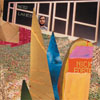 Nick Forte is half of a duo called Christmas Decorations that releaseda pretty decent album on Kranky last year. For his first soloexcursion, he's come up with a mini-album that crams 15 tracks intojust over half and hour. The record has an excellent starting point in"Green Language," where Forte expertly weaves together a dubbed-outbackdrop, broken-down machine beats and swirling layers of sound andnoise into a really satisfying work that always seems to be on theverge of falling apart. But the good feeling brought on by of thosefirst few moments is quickly deflated, as the one- to two-minute tracksthat make up most of the disc are unexciting little bursts of abstractsound that go nowhere fast. Some promising flashes of structure appearin a couple of places, most notably on "Thistle Rue" and "ForgottenMusic", but generally Pasted Lakes sounds like a collection of unfinished ideas and unfocused sound farts, few of which I find especially appealing.
Nick Forte is half of a duo called Christmas Decorations that releaseda pretty decent album on Kranky last year. For his first soloexcursion, he's come up with a mini-album that crams 15 tracks intojust over half and hour. The record has an excellent starting point in"Green Language," where Forte expertly weaves together a dubbed-outbackdrop, broken-down machine beats and swirling layers of sound andnoise into a really satisfying work that always seems to be on theverge of falling apart. But the good feeling brought on by of thosefirst few moments is quickly deflated, as the one- to two-minute tracksthat make up most of the disc are unexciting little bursts of abstractsound that go nowhere fast. Some promising flashes of structure appearin a couple of places, most notably on "Thistle Rue" and "ForgottenMusic", but generally Pasted Lakes sounds like a collection of unfinished ideas and unfocused sound farts, few of which I find especially appealing.samples:
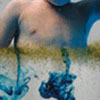 I did, however, find a lot to enjoy on Chaotech Odd Echo,the first full-length album from Japan's Kiyoshi Ono a.k.a. Kiyo.Reportedly, this disc arrived at the Schematic offices with a note thatread "Enjoy warm noise from Japan," and that phrase that fits the albumquite nicely. The artist's website bio reveals him to be a fan of DavidLynch and Stanley Kubrick, and through his juxtaposition of melodicsketches and fractured beats with layers of subtle rumbles andin-and-out waves of crackling static, he manages to evoke a sense ofunease and edginess in his music that is similar to that found in thosedirector's films. There are a couple moments where things threaten toget a little too flighty and abstract, but Kiyo has a good handle onhow to keep the listener's attention by balancing those non-linearimpulses with warm harmonics and clank-and-crunch rhythms.
I did, however, find a lot to enjoy on Chaotech Odd Echo,the first full-length album from Japan's Kiyoshi Ono a.k.a. Kiyo.Reportedly, this disc arrived at the Schematic offices with a note thatread "Enjoy warm noise from Japan," and that phrase that fits the albumquite nicely. The artist's website bio reveals him to be a fan of DavidLynch and Stanley Kubrick, and through his juxtaposition of melodicsketches and fractured beats with layers of subtle rumbles andin-and-out waves of crackling static, he manages to evoke a sense ofunease and edginess in his music that is similar to that found in thosedirector's films. There are a couple moments where things threaten toget a little too flighty and abstract, but Kiyo has a good handle onhow to keep the listener's attention by balancing those non-linearimpulses with warm harmonics and clank-and-crunch rhythms. Read More
- Administrator
- Albums and Singles
 For the second full-length collaborative release between members ofLanding and Yume Bitsu, Surface of Eceyon have decided to use theirlive studio tracks without overdubs or post-production. By doing this,listeners have a special glimpse at what their raw in-studio sessionsactually sound like. The down side is the curse of the fade ins andouts: Fading a song in at the beginning and out at the end is a majorcop-out. I can't think of one listener who is fooled into believingthat what we hear is all that there is when a song fades in at thebeginning and/or out at the end. The result is the feeling that thereis something more that we're not allowed to have. Most of the time, thereason is that the group probably agreed to use the most interestingpart. Using that argument, however, it's clearly a way to cheat theobstacle of composing a good song with an appropriate cadence. Iconsider Landing close friends of mine and I have loved nearlyeverything I have heard. I've seen Adam Forkner before live both withYume Bitsu and Surface of Eceyon and so long as the hair and prancingcan be ignored, there is a lot to be said about the sounds that fireout of his guitar. It's not beyond any of them to write a good song,but a lot of neat guitar effects, late night jam sessions, and decentriffs doesn't necessarily make a great record.
For the second full-length collaborative release between members ofLanding and Yume Bitsu, Surface of Eceyon have decided to use theirlive studio tracks without overdubs or post-production. By doing this,listeners have a special glimpse at what their raw in-studio sessionsactually sound like. The down side is the curse of the fade ins andouts: Fading a song in at the beginning and out at the end is a majorcop-out. I can't think of one listener who is fooled into believingthat what we hear is all that there is when a song fades in at thebeginning and/or out at the end. The result is the feeling that thereis something more that we're not allowed to have. Most of the time, thereason is that the group probably agreed to use the most interestingpart. Using that argument, however, it's clearly a way to cheat theobstacle of composing a good song with an appropriate cadence. Iconsider Landing close friends of mine and I have loved nearlyeverything I have heard. I've seen Adam Forkner before live both withYume Bitsu and Surface of Eceyon and so long as the hair and prancingcan be ignored, there is a lot to be said about the sounds that fireout of his guitar. It's not beyond any of them to write a good song,but a lot of neat guitar effects, late night jam sessions, and decentriffs doesn't necessarily make a great record. Read More
- Administrator
- Albums and Singles
 The title means "the open society," and Thilges3 mean it. The bandprides themselves on a bit of performance politics, but in this casethey come off as the free labor wing. Thilges3 firmly believe thatvenue affects performance, and therefore select carefully where torecord and who to record with. The only thing that remains a constant,is the paint they splatter on their canvas: analogue synthesizers. Die Offene Gesellschaftis their debut full-length, and shows great potential for their concept— society-altering music — while failing in certain aspects. Thealbum's opening is a call to arms, with stuttered synth beats andwhale-like echoes showing the way. The mind stutters, the feet want tomove, and the hands want to act. Though repititious, it serves whatseems to be its intended purpose: what you are about to hear is not tobe taken lightly. The songs on the album came out of performances forchildren, monks, and criminals, and field recordings of all three findtheir way onto the release, which is part of the wonder and all of theproblem. The second track opens with a conversation over dinner, thatincludes chants, flatware on plates, even someone blowing their nose.Unfortunately, it sounds like what you hear at a concert when no one isinterested in what's on stage. It serves no purpose at all, other thanto start the track but fade out when the real music starts; and when itcomes in, it creates a stir of fears with its loud pulses, glitches,and swirls. The music is fine, it's just the field recordings that areunnecessary and maim the performance rather than help it in areas. Thechildren chatting and singing on "KiBe," for instance, annoy more thanentertain, and it took me away from the glory of the music. The venueis important, just as long as it's empty. Once Thilges3 try that on forsize, the music will take over, and the results won't just beinnovative: they'll be stunning.
The title means "the open society," and Thilges3 mean it. The bandprides themselves on a bit of performance politics, but in this casethey come off as the free labor wing. Thilges3 firmly believe thatvenue affects performance, and therefore select carefully where torecord and who to record with. The only thing that remains a constant,is the paint they splatter on their canvas: analogue synthesizers. Die Offene Gesellschaftis their debut full-length, and shows great potential for their concept— society-altering music — while failing in certain aspects. Thealbum's opening is a call to arms, with stuttered synth beats andwhale-like echoes showing the way. The mind stutters, the feet want tomove, and the hands want to act. Though repititious, it serves whatseems to be its intended purpose: what you are about to hear is not tobe taken lightly. The songs on the album came out of performances forchildren, monks, and criminals, and field recordings of all three findtheir way onto the release, which is part of the wonder and all of theproblem. The second track opens with a conversation over dinner, thatincludes chants, flatware on plates, even someone blowing their nose.Unfortunately, it sounds like what you hear at a concert when no one isinterested in what's on stage. It serves no purpose at all, other thanto start the track but fade out when the real music starts; and when itcomes in, it creates a stir of fears with its loud pulses, glitches,and swirls. The music is fine, it's just the field recordings that areunnecessary and maim the performance rather than help it in areas. Thechildren chatting and singing on "KiBe," for instance, annoy more thanentertain, and it took me away from the glory of the music. The venueis important, just as long as it's empty. Once Thilges3 try that on forsize, the music will take over, and the results won't just beinnovative: they'll be stunning. Read More
- Administrator
- Albums and Singles
 The liner notes remark how this recording was played while watching thefires burn in the aftermath of September 11th. There's an emotionalelement present before even a single note is heard. Even without thatintroduction, The Disintegration Loopswould be a masterpiece of minimalist composition. It is suffused withthe most exciting qualities a musical recording can hope to have:simplicity, intrigue, beauty, and emotion. The sound itself is theresult of a recording of American pastoral music on magnetic tapefalling to pieces as it is played and transferred to a digital medium.The disintegration of the tape itself spawns a living and breathingbrass organism swaying to and fro, changing subtly and magnificentlyover time. It's a simple recording, its main attraction being theserenity of the instruments as they fall away and die but it is alsosupported by the elegance of the process itself. There's simply no wayof avoiding the emotional impact this music has. Even without WilliamBasinski's ruminations about the origins of this recording and whatthose origins mean to him, the music would be morose, breath-taking,and triumphant. There's an inescapable sadness throughout the entireexperience but it is coupled with a sense of wonder and freedom and isthe first recent recording I've heard that feels American. This mightbe the result of my ignorance or perhaps the liner notes are beginningto seep into my blood but I can see the plains of Illinois and thebadlands of South Dakota when I listen. The colossal beauty of themountains in the west and the west coast's monolith, the Pacific Ocean,are all resurrected from my memory and relived vividly through thesound of full, tranquil swells. It's astonishing how much the loopchanges over time. Handsome tones begin to distinguish themselves froma mass of sound and breathe their resonant melody through space beforebeing swept away and lost. Released in 2002, The Disintegration Loopsis probably the most exciting and stunning piece of music I've heardsince the year changed over. It has reminded me of how powerful musiccan really be. Don't be fooled, though: the power doesn't have to comefrom the association Basinski draws between September 11th and themusic (though there's nothing wrong with his association). The power iswithin the music and the process, both of which are responsible for thecreation of an album that perfectly captures the geography and spiritof modern America.
The liner notes remark how this recording was played while watching thefires burn in the aftermath of September 11th. There's an emotionalelement present before even a single note is heard. Even without thatintroduction, The Disintegration Loopswould be a masterpiece of minimalist composition. It is suffused withthe most exciting qualities a musical recording can hope to have:simplicity, intrigue, beauty, and emotion. The sound itself is theresult of a recording of American pastoral music on magnetic tapefalling to pieces as it is played and transferred to a digital medium.The disintegration of the tape itself spawns a living and breathingbrass organism swaying to and fro, changing subtly and magnificentlyover time. It's a simple recording, its main attraction being theserenity of the instruments as they fall away and die but it is alsosupported by the elegance of the process itself. There's simply no wayof avoiding the emotional impact this music has. Even without WilliamBasinski's ruminations about the origins of this recording and whatthose origins mean to him, the music would be morose, breath-taking,and triumphant. There's an inescapable sadness throughout the entireexperience but it is coupled with a sense of wonder and freedom and isthe first recent recording I've heard that feels American. This mightbe the result of my ignorance or perhaps the liner notes are beginningto seep into my blood but I can see the plains of Illinois and thebadlands of South Dakota when I listen. The colossal beauty of themountains in the west and the west coast's monolith, the Pacific Ocean,are all resurrected from my memory and relived vividly through thesound of full, tranquil swells. It's astonishing how much the loopchanges over time. Handsome tones begin to distinguish themselves froma mass of sound and breathe their resonant melody through space beforebeing swept away and lost. Released in 2002, The Disintegration Loopsis probably the most exciting and stunning piece of music I've heardsince the year changed over. It has reminded me of how powerful musiccan really be. Don't be fooled, though: the power doesn't have to comefrom the association Basinski draws between September 11th and themusic (though there's nothing wrong with his association). The power iswithin the music and the process, both of which are responsible for thecreation of an album that perfectly captures the geography and spiritof modern America. Read More
- Administrator
- Albums and Singles
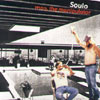 Thelast few years have been a pretty interesting time for pop andelectronic music. As the technological side of music has gained morecredibility as an art form, it's taken on some more "traditional"facets which have spun off a bunch of interesting hybrids that continueto collide and fuse amongst themselves. Man, the Manipulator,the second release from the Chicago art school duo of Shawn King andNate Flanigan as Soulo, is a prime example of how mixing laid back,orchestrated pop songwriting with various areas of electronic music canremain focused without leaning too heavily in one general direction andstill be very "musical" in the traditional sense. The warmth ofacoustic guitar and Theremin-like whistling keyboard on the intro of"How Do You Feel?" remains throughout the addition of relaxed machinebeats, bass end and the near squelch of keyboards, even when it dropsout for some simple, yet effective organ licks. The ethereal "Emotions,Can You Trust Them?" builds from the murkiness of synth ambience tosoft vocals and pitch bending bass peppered with piano, held togetherwith a rhythm so laid-back that you could drive a truck between thebeats. "Born Female" blurs backwards guitar and violin into an almostcall and response melodic line over Rhodes piano, thickeningelectro-bass and crisp machine beats for a sweetness that's summed upin all of two minutes. Rounding out the disc's twelve tracks, "ThePeter Principle" opens with a scratchy punch-in-the-gut rhythm,electro-chaos, feedback and heavy metal power chords that drag it in araunchy direction only to subside in intensity once upright bass,trumpet, violin, clarinet and banjo (yes, banjo) come quickly to theforefront. It's quirky, yet makes perfect sense and totally works. Atjust over thirty-eight minutes, the bulk of the disc's tracks are inand around the three minute mark, which tends to be a bit brief forsome ideas to play out and be embellished. By the same token, Soulo'ssparingly used clever and popish hooks are more effective in thismanner than listening to them repeat a thousand times so as to addanother synth module.
Thelast few years have been a pretty interesting time for pop andelectronic music. As the technological side of music has gained morecredibility as an art form, it's taken on some more "traditional"facets which have spun off a bunch of interesting hybrids that continueto collide and fuse amongst themselves. Man, the Manipulator,the second release from the Chicago art school duo of Shawn King andNate Flanigan as Soulo, is a prime example of how mixing laid back,orchestrated pop songwriting with various areas of electronic music canremain focused without leaning too heavily in one general direction andstill be very "musical" in the traditional sense. The warmth ofacoustic guitar and Theremin-like whistling keyboard on the intro of"How Do You Feel?" remains throughout the addition of relaxed machinebeats, bass end and the near squelch of keyboards, even when it dropsout for some simple, yet effective organ licks. The ethereal "Emotions,Can You Trust Them?" builds from the murkiness of synth ambience tosoft vocals and pitch bending bass peppered with piano, held togetherwith a rhythm so laid-back that you could drive a truck between thebeats. "Born Female" blurs backwards guitar and violin into an almostcall and response melodic line over Rhodes piano, thickeningelectro-bass and crisp machine beats for a sweetness that's summed upin all of two minutes. Rounding out the disc's twelve tracks, "ThePeter Principle" opens with a scratchy punch-in-the-gut rhythm,electro-chaos, feedback and heavy metal power chords that drag it in araunchy direction only to subside in intensity once upright bass,trumpet, violin, clarinet and banjo (yes, banjo) come quickly to theforefront. It's quirky, yet makes perfect sense and totally works. Atjust over thirty-eight minutes, the bulk of the disc's tracks are inand around the three minute mark, which tends to be a bit brief forsome ideas to play out and be embellished. By the same token, Soulo'ssparingly used clever and popish hooks are more effective in thismanner than listening to them repeat a thousand times so as to addanother synth module.Read More

